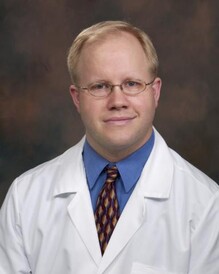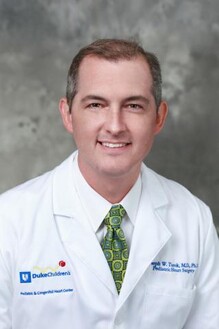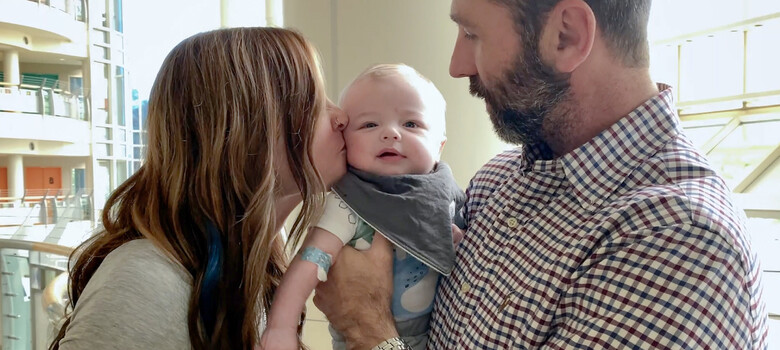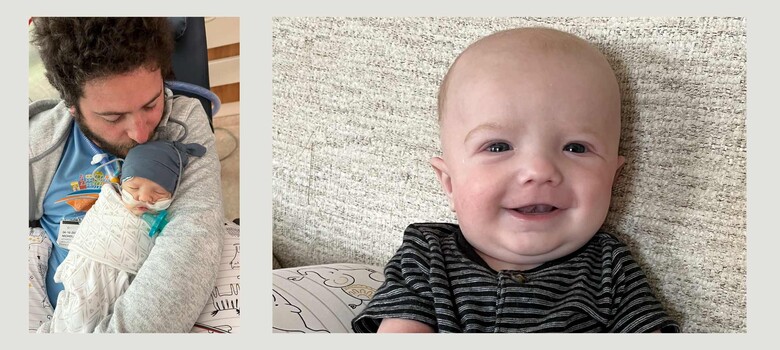Baby with Congenital Heart Defect Doing Well After Complicated Heart Surgery at Duke Health

Davis and Shanna Hodges hold their son, Eli, after a clinic visit in Durham, NC.
Eli Hodges was born with a life-threatening congenital heart defect that prevented his heart from pumping oxygenated blood throughout his little body. After two innovative procedures at Duke Health, the now four-month-old is back home with his family and growing every day. “There aren’t enough nice things I can say about Duke’s whole team,” said Eli’s father Davis Hodges. “They are doing some great things.”
Prenatal HLHS Diagnosis
Shanna Hodges of Princeton, NC was halfway through her pregnancy when she and her husband Davis learned their unborn son had hypoplastic left heart syndrome (HLHS). “At that moment, there was a void in my chest, like somebody reached inside my body and pulled out my heart and lungs,” Davis Hodges said. In children with HLHS, the left side of the heart forms abnormally, disrupting blood and oxygen circulation.
The Hodges transferred care to Duke Health, where they met fetal and pediatric cardiologist Stephen Miller, MD. After confirming the diagnosis with a fetal heart ultrasound, Dr. Miller prepared the Hodges for their son to undergo the Norwood operation -- the first in a series of three complex heart surgeries that re-plumb the heart -- just days after birth.
Adjusting for an Unexpected Complication
After Eli was born on May 28, 2024 at Duke University Hospital, he was transferred to the pediatric cardiac intensive care unit (PCICU) to await surgery. A few days later, Eli developed a small abscess in his abdomen, which meant his Norwood operation would have to wait. That left Eli’s lungs susceptible to pulmonary hypertension, a type of high blood pressure in the lungs that can cause permanent damage.
To avoid that, Duke pediatric interventional cardiologist Reid Chamberlain, MD, and his team performed a minimally invasive catheterization procedure to insert flow restriction devices in Eli’s lungs. “The advantage is that you don't have to open the chest, and you don't have to manipulate the outside of the vessels,” said Dr. Chamberlain. The procedure is only available at the nation’s best pediatric heart centers, like Duke’s. “The Duke Pediatric and Congenital Heart Center has great teams with a lot of collective experience and expertise. It helps to have these tools in our toolbox,” Dr. Chamberlain said. “For certain patients, catheter-based procedures like this can complement larger heart surgeries to help kids have the best outcomes possible.”
The Norwood Procedure and STAR Perfusion
Two weeks later, Eli was healthy enough for his Norwood procedure. Duke pediatric heart surgeon Joseph Turek, MD, used an advanced technique called Sustained Total All-Region (STAR) perfusion, which he and colleagues pioneered at Duke. While the traditional approach requires stopping the patient’s heart and cooling their organs, STAR perfusion allows the heart to continue pumping and all the body’s organs -- including the brain, heart, and kidneys -- to receive blood flow. This lowers the chance of organ malfunction and increases the odds of survival. “These little babies tolerate a complex operation so much better with this technique,” said Dr. Turek.
Recovering and Preparing for Next Steps
Eli was two months old when he was discharged from the hospital on July 31, 2024. Today, Davis and Shanna Hodges are grateful to have their family reunited at home as they prepare for the next step. Eli has frequent clinic visits with Dr. Miller and is scheduled to undergo the Glenn operation -- the second in a series of surgeries that treat HLHS -- in early November 2024. He will need a third surgery called the Fontan operation before he turns three.
“Our goal for Eli and for all the kids that we operate on is for them to live the fullest lives that they can,” said Dr. Turek.
Giving Back
Davis Hodges was overwhelmed by how well his family was treated at Duke. “The care and compassion, the customer service, it's beyond what anybody would expect.” To show his appreciation, Davis Hodges nominated a nurse for a national award, brought ice cream to the entire PCICU and step-down unit staff, and started a campaign to collect soda can tabs to donate to the Ronald McDonald House where he and Shanna often stayed during Eli’s hospitalization.
“Remaining flexible, keeping the faith, and never giving up, those are the three key things that got us through this rocky road,” Davis Hodges said. “I feel like the good Lord moved me to advocate for congenital heart babies as a whole and to tell Eli's story. I told myself if I ever get the opportunity, I'm not going to shy away from it.”





